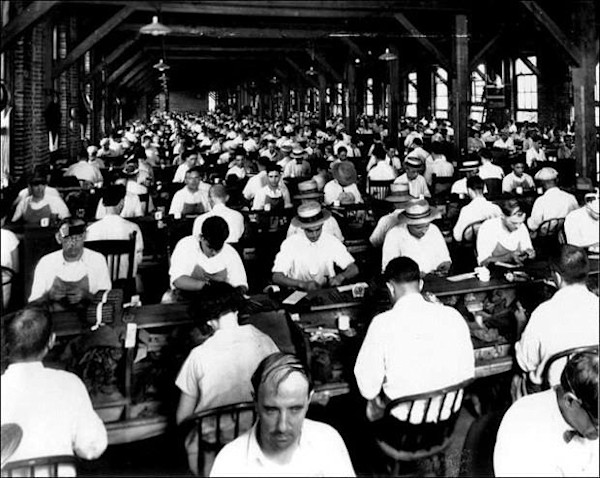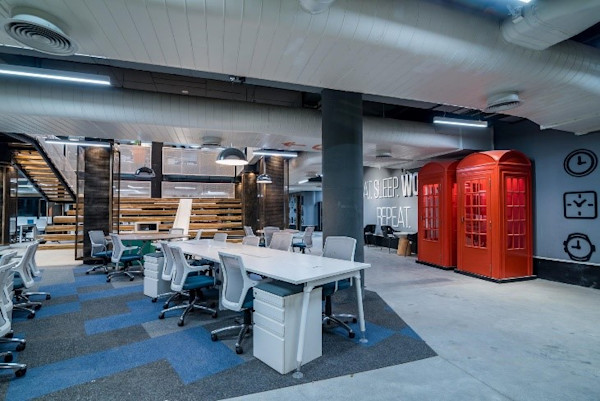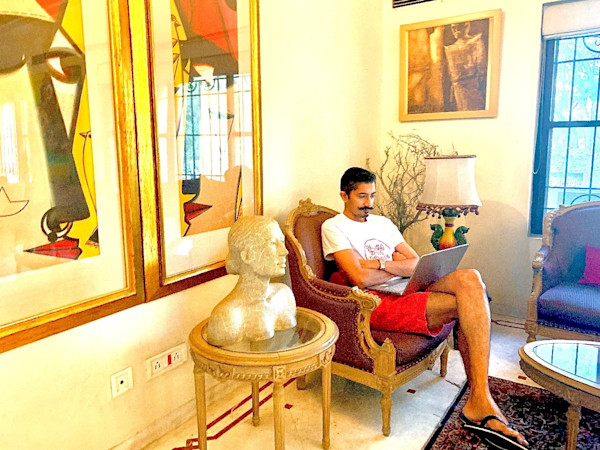A Time to Reflect: Where do Pants Feature in the Future of Workplaces?
CEO Jay Krishnan's insights into what the most innovative (and successful) companies will need to build social capital and retain top talent.

To put the importance of the office into perspective, we need to go way back in corporate history. In 2013, Yahoo banned employees from working from home in a not-so-eventful time during the pre-pandemic era. Safe to say, most leaders preferred to see staff, staff preferred being in the office most of the time, and everything else seemed reasonably in balance.

Then the virus happened. Unquestionably, COVID-19 has changed the paradigm of the traditional workplace forever. The prevalence of remote work has accelerated and even become the norm in the knowledge economy. Spanning the March of 2020 through December of 2021, I spent 90% of my meetings in casual clothing, typically a t-shirt and consistently featuring shorts. That dinky laptop camera was also exposed to high couture for a few sessions—a jacket and tie for extra important meetings. But the shorts stayed. Zoom was happy. So were the oblivious participants on the other side. Perhaps they were in this now familiar fashion adventure as well.
Today, many focus on the elusive concept of the 'office.' Over the last two years, a realm of knowledge-based work driven by connections and collaborations of physical workspaces disappeared from physical offices. But, hopefully, it is not gone for good.
As a startup incubation leader of an industry that catalyzes innovation and entrepreneurship, I often wonder (in my shorts, of course) if physical workspaces will emerge back as a catalyst for innovation. Will a new generation of new entrants to the workforce not know about the water cooler culture, the occasional walk to lunch with coworkers, and all things essentially that drove culture in the office? I think of these connections as an essential resource for entrepreneurs.
Pandemic impacts on where we work
Thankfully digital transformation accelerated in the workplace over the course of the initial lockdowns and has truly transformed the way we work. Admirably, across the globe, enterprises scrambled, hustled, and set up digital infrastructure that enabled millions to work from home during the pandemic of 2020. As a result, it was estimated that in the second quarter of 2020, over 550 million workers ended up working from home, which adds up to 17% of the global workforce. Which is not only unparalleled since the advent of the open space culture but a contrarian polar opposite to ‘Taylorism’, a framework postulated by Frank Taylor, who sought to maximize industrial efficiency.

With its tendency to adopt new tech early and often, sectors powered by tech have made this transition incredibly well. However, one could argue that the sailing might not have been as smooth on the home front, with kids in remote learning in the background and a partner/spouse also potentially hogging bandwidth, all trying to steal the ideal space in the house showcased the best zoom background.
The new question I now wonder about as I set off on the great migration to the kitchen, one which lasts eleven seconds longer than the last one to get another cuppa, is if a community like this is immune from the challenges of adapting to long-term remote work. Ultimately, we need to go back to the office and meet with people with real pants on, right?
2020-21 also taught us Newton's first law of motion, inertia. Many newly home-based workers got accustomed to remote work perks such as the lack of commute, our adventures in fashion incongruence, the recently discovered skills to mark our zoom territory in the house. However, as a community, I believe there is a price we paid (and continue to pay) for working remotely, that of social capital.
Ingredients in innovation
Social capital or networks of relationships among people that work together is essential for collaboration. And this collaboration often leads to interesting new ideas. Some of those ideas are innovative, and a few of them are even disruptive! Our community at the Accelerator Centre is no different. The community of like-minded entrepreneurs and innovators who connect, collaborate, and encourage each other drives innovation and makes for a more robust ecosystem.
In the grand scheme of humankind, we began to innovate and evolve as a society not so long ago - starting from stone tools, expression of creativity through cave art, development of agrarian civilizations, etc. This was catalyzed by the emergence of communities that supported and drove creativity and innovation for the group's betterment. To be fair, it's the same ethos that allowed us to battle this pandemic, including the development of the vaccines, figuring out distribution globally, and trying to bounce economies back, all while trying experiments and pivoting mechanism like lockdowns.
The core concept of social capital and communities is what today's global community of entrepreneurs is all about. The pandemic has also demonstrated the zeroth law of thermodynamics. If two systems are both in thermal equilibrium with a third system, they are in thermal equilibrium. I find this peculiarly calming that after a year and a half, there's equilibrium on the home front and on the work front now that all key players have staked their claims to space and to habits, one which included the purchase of an additional pair of shorts.
So what next?
As a world-class startup hub that supports hundreds of companies each year, we've long known the value of these collaborative workspaces and the role that physical proximity plays in driving innovation and community. There is no better validation of ideas than running it by other folks in the community, who would have perhaps tried, tested, and failed. But keeping in tune with the variants and the times, we want to create an environment that fosters a truly hybrid environment.
The solution is adapting. We're working on new ways to foster and build the social capital within the founders and their teams. And to create the ability to access extensive networks outside of the ecosystem, virtually and physically, to ensure that the connections & collaborations are outcome-driven- ones that drive innovation to continue.
In the long-term, the most innovative (and successful) companies will be the ones that can leverage an organic ecosystem culture and an organically evolving hybrid work model. The ecosystems that succeed will be the ones that are designed to build social capital and retain top talent as the now tech-fueled corporate culture reveals a new future.
Presenting Exhibit A: Adaptive Coworking spaces
Coworking spaces as we know them today were developed in Germany in the mid 90's. Coincidentally, they were primarily used by the startup community at the time, and now there are tens of thousands of these collaborative spaces worldwide.
At least for now, with sporadic occupancy in the physical space, yet a growing need for collaboration, I think the days of the individuals being married to their desks are done. Having the flexibility to come in when people want and where they want will not only provide the solution, but pave the way to encourage collaboration.
How you can leverage coworking spaces for your business
1. Set up a home-base
Having a place to call home and a community to build social capital will set your company on the right path to make innovation a priority. Coworking spaces manage the facility and amenities so you can focus on your business and use the space to support your company and your team without taking on more space than you need. In addition, it frees you up from long-term commitments to being incubated at the AC (Although I highly recommend getting incubated in our program).
2. Use coworking facilities as a "spoke" in your workplace strategy
What today's top talent wants is ultimate flexibility. For some, that means working from home as much as possible, and for others, access to an office space to sample that incredible vending machine coffee on demand is essential. Either way, coworking spaces can offer that flexibility through shared space models to give you and your team access to the office when they want it, without increasing your real estate footprint.
3. Create experiences
This new paradigm will unleash an interesting avenue to create experiences. A couple of years ago, that would have meant a few foosball tables and some beanbags. The next generation of coworking experiences will be curating collaboration rooms ornate with plants, whiteboards and beer on tap. Our new meeting rooms will be decked out with new technology infrastructure and wait for it… "meeting rooms, meet virtual participants," through 360-degree cameras that follow the speaker in real-time, giving the remote participant an immersive experience. I wonder, almost as a quasi prank, if pre–Gen Z gizmos will make a comeback, like lockers, telephone booths, etc.
It's clear that the workplace has changed forever. I believe so strongly in the power of coworking spaces and their role in the future of the innovation economy that we revised our business model to prioritize it and wrote a whitepaper about trends in the Waterloo tech community as it relates to hybrid work. This model allows for taking up office space when you really want to get away from home, finding that true freedom and flexibility to get away from home when needed, and taking a break from the office when the conversation between Java versus python reaches a non-fungible din. And for me personally, an opportunity to toggle between pants and shorts.



About Jay Krishnan
Jay Krishnan is a globally successful entrepreneur (with one failure under his belt), investor (with many failures under his belt), innovation ecosystem builder (hopefully no failures), and Chief Executive Officer of the Accelerator Centre.
An executive leader with over 20 years of experience, Jay boasts an impressive resume of international success. With expertise spanning the venture capital space, entrepreneurship, and product development and management, Jay knows firsthand what it takes to turn a good idea into a great one and to grow a company from a startup to a globally competitive business.
Having been involved in the founding stages of 3 startups himself, he has experienced the full startup lifecycle - from failure to success- spanning seeding, raising capital, scaling and exit; with one company ultimately acquired by a multi-national conglomerate.
About the Accelerator Centre
For innovators to actualize, accelerate, and thrive. Based in Waterloo, Canada, the AC is the proven full-stack startup hub offering opportunities for the world's most ambitious innovators and dreamers who are driven to impact global change through their business. The AC provides virtual programming and mentorship for startup founders and operates coworking spaces across Waterloo Region.